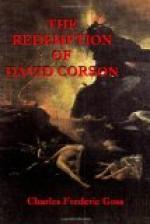The religious experiences of men in any such epoch possess a certain general similarity. Sometimes thought, sometimes action and sometimes emotion furnish the all-pervasive element. Whatever this peculiar characteristic may be, its manifestations are always most vivid and violent in ignorant periods, and along the uncultivated frontiers of advancing civilization. In those rude days and regions, the victims (if one might say so) of religion experienced nervous excitations and emotional transports which not infrequently terminated in convulsions. Days and nights, weeks and even months, were often spent by them in struggles which were always painful and often terrible.
Andy McFarlane had often enough witnessed and despised these experiences; but through those almost inexorable laws of association and imitation, they were more than likely to reproduce themselves in him. And so indeed they did. Under the influence of these new thoughts that had seized him with such power, he writhed in agony on the ground. A profound “conviction of sin” took possession of his soul and he felt himself to be hopelessly and forever lost. That hell at which he had so often scoffed suddenly opened its jaws beneath his feet, and although he shuddered at the thought of being engulfed in its horrors, he felt that such a doom would be the just desert of a life like his.
Hours passed in which his calmest thoughts were those of complete bewilderment and helplessness, and in which he seemed to himself to be floating upon a wide and shoreless sea, or wandering in a pathless wilderness or winging his way like a lost bird through the trackless heavens. However large an element of unreality and absurdity there may have been in such experiences, it is certain that changes of the most startling and permanent character were often wrought in the natures of those who passed through them, and when McFarlane at last emerged from this spiritual excitement he was a strangely altered man. He seemed to find himself in another and more beautiful world. Looking around him with a childlike wonder, he rose and made his way back to the cabin. He listened at the door, but heard no sound. He entered, found the room empty, and gave himself up to rude and unscientific speculation as to the nature of this mysterious adventure. Nothing helped to solve the problem, until at last he discovered the Bible, which the Quaker had hurled at the snake, lying upon the hearthstone. It did not explain everything, but it served to connect the inexplicable with the real and human, and he carried the book with him when he returned to his companions with his recovered axe.
That Bible became a “lamp to his feet and a light to his path.” By patient labor he learned to read it, and soon grew to be so familiar with its contents, that he was able not only to communicate its matter to others, in the new and beautiful life which he began to live, but to give it new power for those men in the plain and homely language of which he had always been a master.




